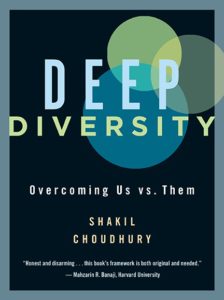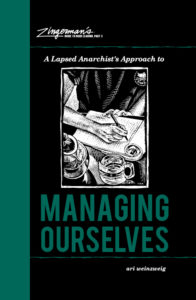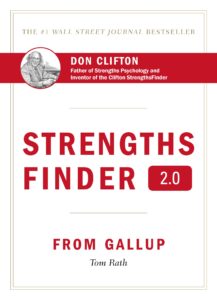ICL’s staff pick their favorite books on leadership for this summer.
Deep Diversity: Overcoming Us vs. Them by Shakil Choudhury
Recommended by Dianne Russell
To fuel our needed work to increase the racial and ethnic diversity of those engaged for the sake of our communities and the planet, I recommend Deep Diversity: Overcoming Us vs. Them by Shakil Choudhury. Choudhury’s lively stories and current examples deliver a very accessible and well-organized framework grounded in significant social science scholarship. Deep Diversity offered me support for understanding my personal emotions & bias around race and ethnicity. I also appreciated its nuanced understanding of tribes and power in North American society. I gained hope, compassion, and practical approaches to our urgent and collective work to change our hard-wired perceptions of “us” and “them.”
Zingerman’s Guide to Good Leading Part 3: A Lapsed Anarchist’s Approach to Managing Ourselves by Ari Weinzweig
Recommended by Sarah Clark
Ann Arbor’s Zingerman’s Deli is more than a foodie paradise. Zingerman’s founder Ari Weinzweig peels back the curtain on a key pillar to success in “Zingerman’s Guide to Good Leading Part 3: A Lapsed Anarchist’s Approach to Managing Ourselves”. Ari puts it best, this book is “based on the firm belief that the way we manage ourselves will have a hugely positive impact on our lives, our families, our friends, and our organizations, and even, in the end, on the entire planet.” Chapters stand alone –read the book cover to cover, or dive into topics like mindfulness, the power of personal vision, making space for creativity, and the connection between the way we think and how we lead. Two of my favorites: his tribute to Edgar Schein on the role of leaders in setting organizational culture and how to enhance the quality of your relationship with time. Special bonus: read while dining on food prepared using Zingerman’s recipes in the back of the book.
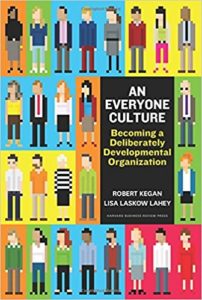 An Everyone Culture: Becoming a Deliberately Developmental Organization by Robert Kegan and Lisa Laskow Lahey
An Everyone Culture: Becoming a Deliberately Developmental Organization by Robert Kegan and Lisa Laskow Lahey
Recommended by Carol Hamilton
What if you were able to give up the second job you are likely doing at your organization, namely, covering your weaknesses, trying to look your best and managing other people’s impressions of you? It is a great waste of organizational resources, yet assumed by most to be inevitable. Deliberately developmental organizations do not. While there are only a few examples of the organizations that put human development at the center of their business strategy, seeing it as one and the same rather than an either/or trade-off, these organizations create intentional cultures that center on adult development through a myriad of practices and point to their cultures as the reasons for their business success. This book will test your assumptions about the “why” behind human development.
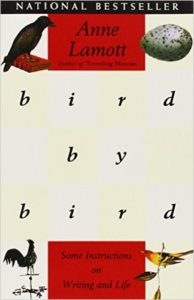 Bird by Bird by Anne Lamott
Bird by Bird by Anne Lamott
Recommended by Megan Rolfe
“Perfectionism is the voice of the oppressor.” This is just one of the many gems from Lamott in her book intended as a guide for writers, however the subtitle is “Some Instructions on Writing and Life,” and it’s that last bit that makes it truly universal. Witty, grounding, and soulful, Lamott encourages us to be vulnerable and celebrates the creative process in all of its messy humanness. So easily our leadership can be snuffed by the stories we tell ourselves about our own abilities. Whether it’s a blank page or a big undertaking at work, I often remind myself that, just like Lamott’s brother, who was daunted by a school project about birds that he was starting the night before it was due, the only way to move forward is to take it one bird at a time.
StrengthsFinder 2.0 by Tom Rath
Recommended by Bobbi Russell
StrengthsFinder is an incredible tool for understanding your own strengths and learning how to make the most out of them in your work and personal life. I’ve benefitted from understanding my natural talents better – and have honed those talents knowing that they’re part of my core make-up. I’ve also used the assessment outcomes to shape project teams and help to pair individuals with supervisors. I really like the tone of this leadership frame because it focuses on our strengths, rather than weaknesses.
It’s not a traditional book in that you take an online assessment (access comes with the book) and then use the book to learn about your strength themes. This book provides descriptions for 34 strengths themes, how they might sound like you based on your own top five strength themes, how to maximize the strengths, and also what to watch out for (i.e. your blindspots). Essentially, StrengthsFinder can help you discover and develop your natural talents.
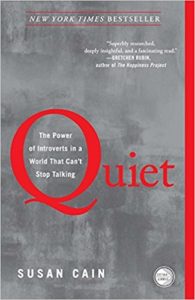 Quiet: The Power of Introverts in a World That Can’t Stop Talking by Susan Cain
Quiet: The Power of Introverts in a World That Can’t Stop Talking by Susan Cain
Recommended by Thu Pham
Quiet: The Power of Introverts in a World That Can’t Stop Talking honors a non-traditional leadership style, which can be undervalued in a society that views leadership as being assertive, having control/power, and holding a specific position, very male-centric traits. I appreciate this book because I’m generally drawn to people who have quiet confidence, are collaborative in nature, and draw personal contentment from being successful behind the scenes.
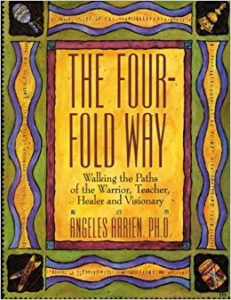 The Four-Fold Way: Walking the Paths of the Warrior, Teacher, Healer, and Visionary by Angeles Arrien
The Four-Fold Way: Walking the Paths of the Warrior, Teacher, Healer, and Visionary by Angeles Arrien
Recommended by Gopinath Bloch
The book explores four archetypes of the Native American medicine wheel and provides immediately applicable tools to use for my own leadership practice. I’ve found myself being more aware and intentional with my actions, depending on which path is best applicable to the situation. This book opened me up to a lot of gratitude, physical well-being, empathy, (for myself and others) and the importance of being clear and true to my word.
We would love to hear from you! What is a book that has inspired your leadership? Please share your recommendation with us for a future blog post.

